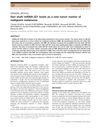 8 citations,
August 2009 in “Pediatric transplantation”
8 citations,
August 2009 in “Pediatric transplantation” A five-month-old boy with Omenn syndrome successfully recovered after a stem cell transplant with reduced intensity conditioning.
 7 citations,
November 2022 in “Communications biology”
7 citations,
November 2022 in “Communications biology” Keratin injections can promote hair growth by affecting hair-forming cells and tissue development.
 7 citations,
January 2018 in “Medicinski arhiv”
7 citations,
January 2018 in “Medicinski arhiv” A herbal extract may help treat certain types of hair loss by reducing a specific gene's activity.
 7 citations,
December 2017 in “Anais da Academia Brasileira de Ciências”
7 citations,
December 2017 in “Anais da Academia Brasileira de Ciências” 6-Gingerol from ginger may slow down hair growth by affecting certain enzymes and growth factors.
 7 citations,
December 2014 in “Journal of dermatology”
7 citations,
December 2014 in “Journal of dermatology” Hair shaft miR-221 levels can help detect malignant melanoma.
 6 citations,
May 2022 in “Aging”
6 citations,
May 2022 in “Aging” Si Jun Zi Tang may slow aging by affecting specific cell signaling pathways.
 6 citations,
March 2020 in “Scientific reports”
6 citations,
March 2020 in “Scientific reports” Hair growth genes work better with more glucose due to changes in gene-regulating markers.
 6 citations,
January 2016 in “Journal of Stem Cell Research & Therapy”
6 citations,
January 2016 in “Journal of Stem Cell Research & Therapy” Notch1 signaling is crucial for improving wound healing and skin regeneration by affecting stem cell behavior.
 5 citations,
October 2020 in “Frontiers in Cell and Developmental Biology”
5 citations,
October 2020 in “Frontiers in Cell and Developmental Biology” Reducing FOXA2 in skin cells lowers their ability to grow hair.
 5 citations,
June 2018 in “Records of Natural Products”
5 citations,
June 2018 in “Records of Natural Products” Garden cress extract may help treat skin inflammation and androgen-related disorders.
 3 citations,
December 2019 in “Biomedical dermatology”
3 citations,
December 2019 in “Biomedical dermatology” Sonic hedgehog proteins may help grow hair.
 3 citations,
April 2019 in “Human & Experimental Toxicology”
3 citations,
April 2019 in “Human & Experimental Toxicology” Finasteride causes harmful organ changes in female mice.
 3 citations,
January 2016 in “Biotechnology and Bioprocess Engineering”
3 citations,
January 2016 in “Biotechnology and Bioprocess Engineering” Laminaria japonica extract with IGF-1 improved mouse hair growth and could be a potential alopecia treatment.
 1 citations,
December 2023 in “Scientific reports”
1 citations,
December 2023 in “Scientific reports” 3D microenvironments in microwells improve hair follicle stem cell behavior and hair regeneration.
 1 citations,
September 2023 in “eLife”
1 citations,
September 2023 in “eLife” TLR2 is important for hair growth and can be targeted to treat hair loss.
 1 citations,
January 2022 in “Research Square (Research Square)”
1 citations,
January 2022 in “Research Square (Research Square)” CRISPR/Cas9 editing in spinach affects root hair growth by altering specific genes.
 1 citations,
October 2021 in “Gene, cell and tissue”
1 citations,
October 2021 in “Gene, cell and tissue” Grape sap may help reduce hair loss and promote hair growth in rats.
 November 2023 in “Linköping University medical dissertations”
November 2023 in “Linköping University medical dissertations” Keratinocytes and adipose-derived stem cells can effectively heal difficult skin wounds.
 November 2019 in “Harper's Textbook of Pediatric Dermatology”
November 2019 in “Harper's Textbook of Pediatric Dermatology” The document is a detailed medical reference on skin and genetic disorders.
 January 2014 in “Journal of Investigative Dermatology”
January 2014 in “Journal of Investigative Dermatology” Proteins like aPKC and PDGF-AA, substances like adenosine and ATP, and adipose-derived stem cells all play important roles in hair growth and health, and could potentially be used to treat hair loss and skin conditions.
 April 2008 in “Medical & surgical dermatology”
April 2008 in “Medical & surgical dermatology” Certain hairstyles can cause scalp diseases, smoking is linked to hair loss, 5% minoxidil foam is effective for hair loss treatment, and various factors influence wound healing and hair growth.
11 citations,
June 2017 in “Asian-Australasian journal of animal sciences” Fox genes are important for hair growth and development in cashmere goats.
IRS-specific genes in Tan sheep hair follicles peak at birth and may affect wool crimp.
9 citations,
November 2016 in “Archives of Plastic Surgery” The L-U mixture promotes hair growth as effectively as minoxidil.
1 citations,
January 2012 in “International journal of trichology” Sheep hair follicle cells can grow a lot but need the dermal papilla to do so.
 March 2024 in “Skin research and technology”
March 2024 in “Skin research and technology” High CRP levels could indicate vitamin D deficiency in people with alopecia areata.
220 citations,
June 2013 in “The Journal of Pathology” Lichen planopilaris may be an autoimmune disease causing hair loss due to immune system issues in hair follicles.
 16 citations,
January 2018 in “International Journal of Trichology”
16 citations,
January 2018 in “International Journal of Trichology” Minoxidil may help treat hair loss by reducing inflammation-related gene activity in skin cells.
14 citations,
April 2021 in “International journal of molecular sciences” Mesenchymal stem cells may help treat hair loss by improving hair cell growth and reducing inflammation.
 4 citations,
February 2022 in “Journal of Cosmetic Dermatology”
4 citations,
February 2022 in “Journal of Cosmetic Dermatology” Monocytes might be linked to hair loss after COVID-19.























